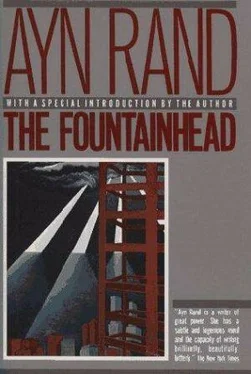This view of man has rarely been expressed in human history. Today, it is virtually non-existent. Yet this is the view with which — in various degrees of longing, wistfulness, passion and agonized confusion — the best of mankind's youth start out in life. It is not even a view, for most of them, but a foggy, groping, undefined sense made of raw pain and incommunicable happiness. It is a sense of enormous expectation, the sense that one's life is important, that great achievements are within one's capacity, and that great things lie ahead.
It is not in the nature of man — nor of any living entity — to start out by giving up, by spitting in one's own face and damning existence; that requires a process of corruption whose rapidity differs from man to man. Some give up at the first touch of pressure; some sell out; some run down by imperceptible degrees and lose their fire, never knowing when or how they lost it. Then all of these vanish in the vast swamp of their elders who tell them persistently that maturity consists of abandoning one's mind; security, of abandoning one's values; practicality, of losing self-esteem. Yet a few hold on and move on, knowing that that fire is not to be betrayed, learning how to give it shape, purpose and reality. But whatever their future, at the dawn of their lives, men seek a noble vision of man's nature and of life's potential.
There are very few guideposts to find. The Fountainhead is one of them.
This is one of the cardinal reasons of The Fountainhead's lasting appeal: it is a confirmation of the spirit of youth, proclaiming man's glory, showing how much is possible.
It does not matter that only a few in each generation will grasp and achieve the full reality of man's proper stature — and that the rest will betray it. It is those few that move the world and give life its meaning — and it is those few that I have always sought to address. The rest are no concern of mine; it is not me or The Fountainhead that they will betray: it is their own souls.
AYN RAND New York, May 1968
I offer my profound gratitude to the great profession of architecture and its heroes who have given us some of the highest expressions of man's genius, yet have remained unknown, undiscovered by the majority of men. And to the architects who gave me their generous assistance in the technical matters of this book.
No person or event in this story is intended as a reference to any real person or event. The titles of the newspaper columns were invented and used by me in the first draft of this novel five years ago. They were not taken from and have no reference to any actual newspaper columns or features.
— AYN RAND March 10, 1943
HOWARD ROARK laughed.
He stood naked at the edge of a cliff. The lake lay far below him. A frozen explosion of granite burst in flight to the sky over motionless water. The water seemed immovable, the stone — flowing. The stone had the stillness of one brief moment in battle when thrust meets thrust and the currents are held in a pause more dynamic than motion. The stone glowed, wet with sunrays.
The lake below was only a thin steel ring that cut the rocks in half. The rocks went on into the depth, unchanged. They began and ended in the sky. So that the world seemed suspended in space, an island floating on nothing, anchored to the feet of the man on the cliff.
His body leaned back against the sky. It was a body of long straight lines and angles, each curve broken into planes. He stood, rigid, his hands hanging at his sides, palms out. He felt his shoulder blades drawn tight together, the curve of his neck, and the weight of the blood in his hands. He felt the wind behind him, in the hollow of his spine. The wind waved his hair against the sky. His hair was neither blond nor red, but the exact color of ripe orange rind.
He laughed at the thing which had happened to him that morning and at the things which now lay ahead.
He knew that the days ahead would be difficult. There were questions to be faced and a plan of action to be prepared. He knew that he should think about it. He knew also that he would not think, because everything was clear to him already, because the plan had been set long ago, and because he wanted to laugh.
He tried to consider it. But he forgot. He was looking at the granite.
He did not laugh as his eyes stopped in awareness of the earth around him. His face was like a law of nature — a thing one could not question, alter or implore. It had high cheekbones over gaunt, hollow cheeks; gray eyes, cold and steady; a contemptuous mouth, shut tight, the mouth of an executioner or a saint.
He looked at the granite. To be cut, he thought, and made into walls. He looked at a tree. To be split and made into rafters. He looked at a streak of rust on the stone and thought of iron ore under the ground. To be melted and to emerge as girders against the sky.
These rocks, he thought, are here for me; waiting for the drill, the dynamite and my voice; waiting to be split, ripped, pounded, reborn; waiting for the shape my hands will give them.
Then he shook his head, because he remembered that morning and that there were many things to be done. He stepped to the edge, raised his arms, and dived down into the sky below.
He cut straight across the lake to the shore ahead. He reached the rocks where he had left his clothes. He looked regretfully about him. For three years, ever since he had lived in Stanton, he had come here for his only relaxation, to swim, to rest, to think, to be alone and alive, whenever he could find one hour to spare, which had not been often. In his new freedom the first thing he had wanted to do was to come here, because he knew that he was coming for the last time. That morning he had been expelled from the Architectural School of the Stanton Institute of Technology. He pulled his clothes on: old denim trousers, sandals, a shirt with short sleeves and most of its buttons missing. He swung down a narrow trail among the boulders, to a path running through a green slope, to the road below.
He walked swiftly, with a loose, lazy expertness of motion. He walked down the long road, in the sun. Far ahead Stanton lay sprawled on the coast of Massachusetts, a little town as a setting for the gem of its existence — the great institute rising on a hill beyond.
The township of Stanton began with a dump. A gray mound of refuse rose in the grass. It smoked faintly. Tin cans glittered in the sun. The road led past the first houses to a church. The church was a Gothic monument of shingles painted pigeon blue. It had stout wooden buttresses supporting nothing. It had stained-glass windows with heavy traceries of imitation stone. It opened the way into long streets edged by tight, exhibitionist lawns. Behind the lawns stood wooden piles tortured out of all shape: twisted into gables, turrets, dormers; bulging with porches; crushed under huge, sloping roofs. White curtains floated at the windows. A garbage can stood at a side door, flowing over. An old Pekinese sat upon a cushion on a door step, its mouth drooling. A line of diapers fluttered in the wind between the columns of a porch.
People turned to look at Howard Roark as he passed. Some remained staring after him with sudden resentment. They could give no reason for it: it was an instinct his presence awakened in most people. Howard Roark saw no one. For him, the streets were empty. He could have walked there naked without concern. He crossed the heart of Stanton, a broad green edged by shop windows. The windows displayed new placards announcing:
WELCOME TO THE CLASS OF '22! GOOD LUCK, CLASS OF '22! The Class of '22 of the Stanton Institute of Technology was holding its commencement exercises that afternoon.
Roark swung into a side street, where at the end of a long row, on a knoll over a green ravine, stood the house of Mrs. Keating. He had boarded at that house for three years.
Читать дальше










